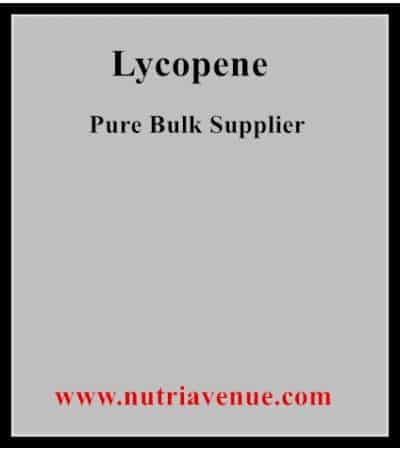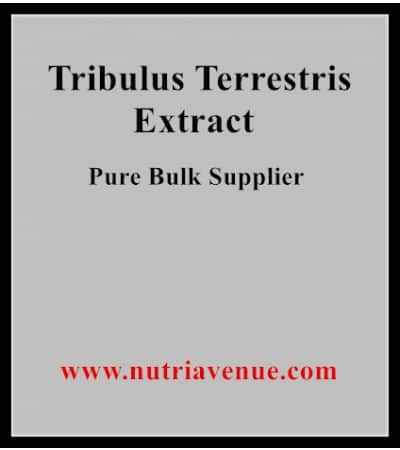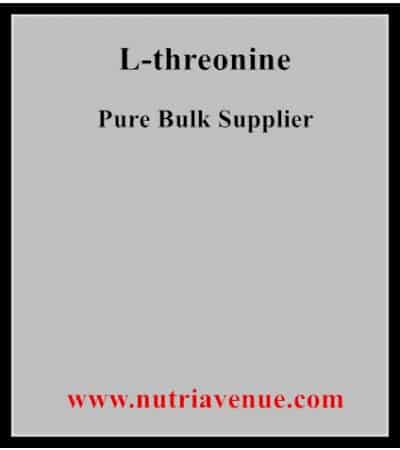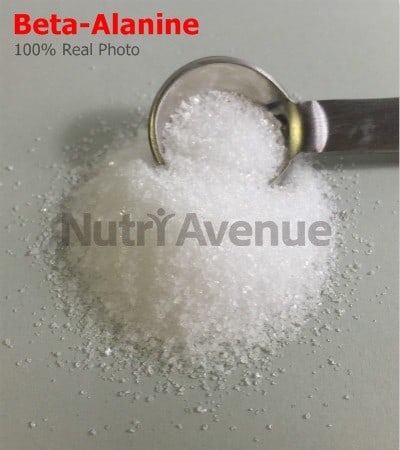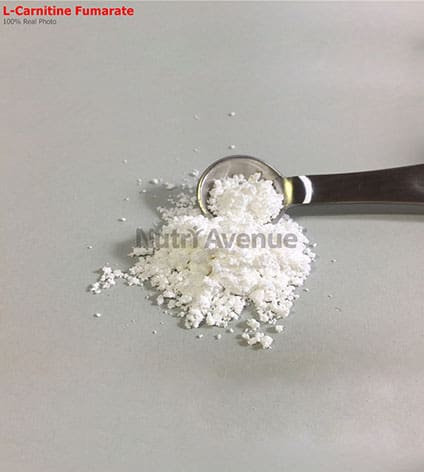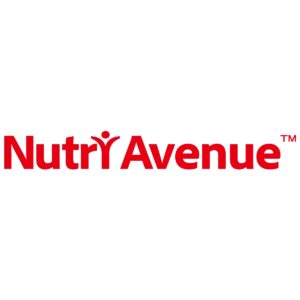Enhance your daily nutrition with NutriAvenue’s Lycopene powder. This well-known and potent antioxidant is your best source for promoting overall health and improving your sense of well-being. Whether you’re just starting your supplement journey or reconfirming your intake, our lycopene powder supplement is your fortress to a better you, helping you to be stronger, energized, and ready to take on the day.
What Is Lycopene ?
Lycopene is a naturally occurring pigment and antioxidant in the carotenoid family. It is responsible for the vibrant red, orange, or pink color in certain fruits and vegetables like tomatoes, watermelon, guava, and pink grapefruit. Unlike other compounds, the human body does not produce Lycopene, so it must be obtained through dietary sources or supplements.
One of the most essential properties of Lycopene is its antioxidant activity. It shields cells against free radicals, unstable molecules that might lead to oxidative damage and chronic diseases. According to research, Lycopene may provide a variety of possible health advantages.
Lycopene has been associated with promoting heart health. Studies indicate that it may help reduce LDL (“bad”) cholesterol levels, improve blood vessel function, and decrease inflammation, contributing to a lower risk of heart disease. Furthermore, lycopene intake has been linked to a lower risk of prostate cancer, possibly due to its ability to protect prostate cells from oxidative damage.
The antioxidant properties of Lycopene also have implications for skin health. Lycopene may help lower the risk of sunburn and maybe prevent skin aging and skin cancer by insulating the skin from UV radiation damage. Moreover, Lycopene is present in the retina and has been associated with a reduced risk of age-related macular degeneration (AMD) and cataracts, highlighting its potential benefits for eye health.
Common Pure Bulk Lycopene Powder Specifications
Lycopene Pure Powder can be available in different purities depending on the product and manufacturing process. Here are two examples of possible purities for Lycopene Pure Powder in the market.
- Lycopene Powder Extract 10%: This indicates that the powder extract contains a minimum of 10% lycopene. The remaining percentage may consist of other natural compounds or excipients used in the formulation.
- Lycopene Oil: Lycopene can also be found in oil form, dissolved or suspended in an oil carrier. The purity of lycopene oil may vary depending on the specific product, but it typically contains a high concentration of Lycopene.
| Type | Supplement ingredient |
| Appearance | Dark red powder |
| Content | Min. 90% Lycopene |
| Purity | Min. 95% |
| Particle Size | 200 mesh |
| Certifications | GMP, ISO |
| Other Ingredient | None |
| Solvent | None |
| Water Content | Max. 5% |
| Test Method | HPLC, UV-VIS, Microbiological tests |
| MOQ (minimum order quantity) | 1kg |
| Sample | Available (10-20g/bag) |
| OEM Service | Available, such as capsules, tablets, pills, etc. |
| ODM Service | Available |
| Private Label | Available |
| Contract Manufacturing | Available |
What Is The Best Source Of Lycopene?
Tomatoes are widely regarded as one of the best sources of Lycopene. Precisely, cooked or processed tomato products, such as tomato paste, tomato sauce, and tomato juice, have higher lycopene content and are more bioavailable than raw tomatoes. Because heat breaks down the cell walls of tomatoes, Lycopene becomes more available for absorption. Additionally, pairing tomatoes with a source of fat, such as olive oil, can further enhance the absorption of Lycopene.
While tomatoes are the most well-known source of Lycopene, other fruits, and vegetables also contain this beneficial compound, although in lower quantities. Watermelon, guava, pink grapefruit, and papaya are examples of fruits that contain Lycopene. Some vegetables like red bell peppers and asparagus contain Lycopene, although in smaller amounts than tomatoes.
To optimize lycopene intake, including various lycopene-rich foods in the diet is beneficial. Cooking or processing tomatoes and consuming them with a source of fat can enhance lycopene absorption. Individual nutritional needs and dietary tastes differ, so it’s best to contact a healthcare practitioner or a qualified dietitian for individualized advice on adding lycopene-rich foods.
What is Lycopene Used for?
Lycopene is used for various purposes due to its potential health benefits. While research is ongoing and more studies are needed, Lycopene has been associated with several applications:
- Antioxidant support: Lycopene is a potent antioxidant that helps protect cells from free radical damage. It can lower oxidative stress and lessen the incidence of chronic illnesses caused by oxidative damage.
- Heart health: Lycopene has been studied for its potential role in promoting cardiovascular health. It may help lower LDL (“bad”) cholesterol levels, reduce inflammation, and improve blood vessel function, which can contribute to a healthier heart.
- Prostate health: Lycopene has explicitly been investigated for its potential benefits in prostate health. Some studies suggest that ingesting Lycopene may be connected to a lower risk of prostate cancer, but more research is needed to establish a clear relationship.
- Skin health: Due to its antioxidant properties, Lycopene is believed to help protect the skin from damage caused by UV radiation and oxidative stress. It may aid in reducing the risk of sunburn, preventing skin aging, and supporting overall skin health.
- Eye health: Lycopene is found in the retina and has been linked to a lower chance of developing certain eye disorders such as age-related macular degeneration (AMD) and cataracts. Its antioxidant properties may help protect the eyes from oxidative damage.
- Cancer prevention: While the evidence is still evolving, some studies suggest that Lycopene may play a role in cancer prevention, particularly for certain types of cancer, including prostate, lung, and digestive cancers. However, more research is needed to understand the mechanisms and potential benefits.
What are the benefits of Lycopene for skin care?
Lycopene offers several potential benefits for skin care due to its antioxidant and anti-inflammatory properties. While more research is needed to understand its effects fully, here are some potential benefits of Lycopene for skin health:
- Sun protection: Lycopene has been examined for its capacity to protect the skin from UV radiation damage. It may help reduce the harmful effects of sunburn and minimize oxidative stress induced by UV exposure.
- Anti-aging effects: Lycopene’s antioxidant properties can help neutralize free radicals contributing to skin aging. Reducing oxidative damage may help prevent the formation of wrinkles, fine lines, and other signs of premature aging.
- Skin hydration: Lycopene may assist in improving skin hydration levels. It helps maintain the skin’s moisture barrier by preventing excessive water loss, leading to softer, more hydrated skin.
- Anti-inflammatory properties: Inflammation is a common factor in many skin conditions. Lycopene’s anti-inflammatory effects may help reduce redness, swelling, and irritation associated with inflammatory skin conditions such as acne, rosacea, or eczema.
- Skin brightening: The capacity of Lycopene to combat oxidative stress and defend against UV damage may aid in the promotion of a more uniform skin tone and the reduction of the development of hyperpigmentation or dark patches.
- Wound healing: Lycopene’s potential anti-inflammatory and antioxidant effects may support wound healing by reducing inflammation, promoting tissue repair, and protecting against infection.
How To Manufacture Lycopene Powder?
The manufacturing process of lycopene powder typically involves several steps. Here is a general overview of the process.
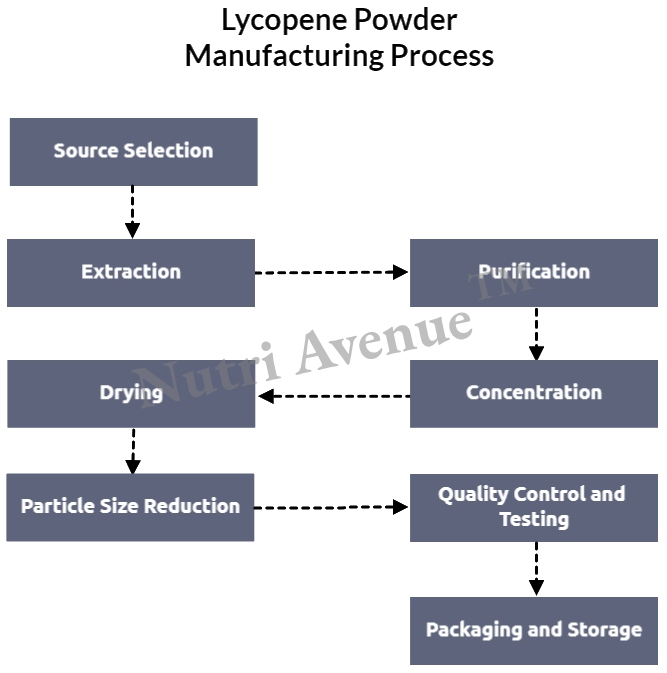
Who is the top pure bulk Lycopene Supplier?
Nutri Avenue is an unmatched source of Lycopene! Nutri Avenue is the leading Lycopene provider, with an uncompromising dedication to quality and innovation. Embrace our impeccable sourcing, cutting-edge manufacturing, and exceptional customer service to unlock the extraordinary potential of Lycopene. Elevate your formulations with Nutri Avenue, the trusted name in Lycopene supply!
FAQs
No, Lycopene is not considered a vitamin.
Lycopene is often associated with anti-aging effects due to its antioxidant properties, although further research is needed to establish its efficacy as an anti-aging ingredient.
Tomato powder is not the same as Lycopene. Tomato powder is derived from tomatoes and may contain compounds like Lycopene. Lycopene is one of the beneficial components found in tomatoes, but it is not the only active ingredient present.

